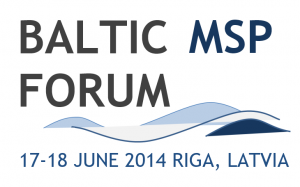 Plenary: MSP in Europe and the Baltic Sea Region – Results of the PartiSEApate project
Plenary: MSP in Europe and the Baltic Sea Region – Results of the PartiSEApate project
Moderator: Jan Ekebom, Metsähallitus Natural Heritage Services
Speakers and presentations
- Lars Emmelin, Blekinge Institute of Technology: MSP – What it is and what it is not - download
- Holger Janßen, Leibniz Institute for Baltic Sea Research: Reflections on MSP in Europe - download
- Andrzej Cieslak, Co-chair of the HELCOM-VASAB Working Group: HELCOM-VASAB Working Group. Intergovernmental MSP cooperation in the Baltic Sea Region - download
- Janne Tamminen, BSSSC and CPRM-BSC - download
- Angela Schultz-Zehden, EPCO, s.Pro – sustainable projects GmbH: PartiSEApate: Multi-Level-Governance in Maritime Spatial Planning - download
Speeches and summaries
Lars Emmelin, Blekinge Institute of Technology
Powerpoint presentation: MSP – What it is and what it is not – download
 MSP is a promising concept. However, MSP itself as well as related terms and approaches are often not precisely defined.
MSP is a promising concept. However, MSP itself as well as related terms and approaches are often not precisely defined.
There is no unanimity what the rationale for MSP is: Is it an environment and resource use problem or a problem of institutional fragmentation and management?
Furthermore, there are different planning philosophies in the European Union; i.e. planning whole space vs. ad-hoc problem solving.
One of the most challenging elements of MSP is the ecosystem approach. The benefit of this approach is that it is a functional approach to time and space (in contrast to the cadastral system in land-based planning). In the context of the ecosystem approach the precautionary principle is often mentioned. However, this principle is hardly ever applied, because the nature of planning is development and not precaution.
Another problem is that stakeholder participation pretends to gather all parties involved at a table for open deliberation. There is the risk that stakeholders will have unrealistic expectation from the process as the terms “participation”, “consultation” and “decision-making” are often mixed up. Furthermore, parties invited represent a selection of stakeholders and it cannot be taken for granted that the conditions for deliberation apply, due to classified or proprietary information as well as tactical behaviour by stakeholders.
MSP claims to allocate areas according to the most suitable use. The decision about the most appropriate use is a subjective one, even if values of sea uses, especially ecosystem services, are identified and measured quantitatively. Planners tend to want overlook political and economic bargaining power, but this factors into the decision about which use is most appropriate.
Another shortcoming is that MSP is set up to plan for the present as well as the future, however this would mean to incorporate redundancies into the planning process. Redundancies are highly inefficient from an economic point of view. Even future developments belonging to the “known unknowns” (e.g. wind and wave power) are hard to predict precisely. Adaptive management and learning systems are a possible solution to this problem.
Experience of public involvement/SEA from comprehensive plans on land is varied and problematic. It is often conducted pro-forma and rather late in the process.
MSP should be more than an extension of terrestrial planning to the sea. We need a pragmatic MSP, a politically governed programme, adequate information and aggregation of information, time-set development restrictions, an adequate and realistic participation process as well as a constructive interplay of marine policy and management.
Holger Janßen, Leibniz Institute for Baltic Sea Research
Powerpoint presentation: Reflections on MSP in Europe – download
 The upcoming MSP directive is a compromise: ICZM, for instance, was abandoned, but the environmental orientation was kept. The question still arises, if countries are well prepared for MSP.
The upcoming MSP directive is a compromise: ICZM, for instance, was abandoned, but the environmental orientation was kept. The question still arises, if countries are well prepared for MSP.
Although progress has been made in the past ten years, there are still some problems from an environmental perspective. MPAs show poor representativity (not all species that need protection are there), have a wrong focus, are underperforming, are just “paper parks”, which are not properly managed. The precautionary principle is currently not applied.
MPA design needs to be integrated in broader-scale MSP and ICZM. Integrated MSP could play an important role in the restoration of biodiversity and also fish stocks. However, the ecosystem approach has hardly been applied in MSP processes in Europe.
Andrzej Cieslak, Co-chair of the HELCOM-VASAB Working Group
 Powerpoint presentation: HELCOM-VASAB Working Group. Intergovernmental MSP cooperation in the Baltic Sea Region – download
Powerpoint presentation: HELCOM-VASAB Working Group. Intergovernmental MSP cooperation in the Baltic Sea Region – download
The HELCOM-VASAB Working Group is a merger of the two intergovernmental organizations HELCOM (focusing on Baltic Sea marine environment, maritime and land based sources of pollution) and VASAB (in charge of spatial planning). The objectives of HELCOM require spatial planning at sea. Because of this interdependency the joint working group was founded in 2010. The group meets twice per year.
The HELCOM-VASAB Working Group agreed on MSP Principles as well as on the MSP Roadmap. Currently, it is following up the implementation of the Roadmap, especially with regard to public participation and consultation, the application of the ecosystem service approach as well as MSP information and data sharing.
MSP (pilot) projects are an important source of information for the Working Group as they test the MSP Principles adopted by the HELCOM-VASAB Working Group.
The Working Group is, furthermore, following up the implementation of the EU Directive on MSP and acting as the Horizontal Action Leader of MSP in the EU Strategy of the Baltic Sea Region.
Janne Tamminen, BSSSC and CPRM-BSC
Powerpoint presentation – download
The CPMR is a think tank and a lobby organization. It is independent from EU institutions, but tries to implement EU policy especially in the spheres of cohesion, maritime issues and accessibility. The CPMR has 161 member regions in 28 EU members and other countries. There are six geographical commissions, the BSR commission is one of them. It stands for 23 regions in seven countries. The secretariat is located in the Helsinki-Uusimaa Region
In the framework of CPMR/BSR there is a working group on maritime issues. MSP is a particular focus of this working group. Its main concerns are the need for subsidiarity and involvement of regions. Furthermore, it is a proponent for linking MSP and ICZM.
The BSSSC (Baltic Sea States Subregional Co-operation) is another regional organization. It is a political network for decentralized authorities. Its Maritime Policy Working Group can give input to MSP in the BSR.
Angela Schultz-Zehden, EPCO, s.Pro – sustainable projects GmbH
Powerpoint presentation: PartiSEApate: Multi-Level-Governance in Maritime Spatial Planning – download
 The Baltic Sea is a unique natural system. Actions have impacts across borders. MSP is necessary to avoid conflicts and maximize opportunities. The PartiSEApate project actively contributes to the development of MSP in the BSR.
The Baltic Sea is a unique natural system. Actions have impacts across borders. MSP is necessary to avoid conflicts and maximize opportunities. The PartiSEApate project actively contributes to the development of MSP in the BSR.
In the framework of the project, recommendations for the future Governance Framework for MSP within the Baltic Sea Region were developed. These recommendations will feed into guidelines on transboundary consultation and cooperation as well on public participation in a transboundary context to be adopted by the HELCOM-VASAB Working Group by 2015.
The recommendation on the future governance framework for MSP are based on a variety of inputs. Lessons from previous projects (BaltSeaPlan, PlanBothnia) have been considered. Apart from that results of the stakeholder dialogue series organized by PartiSEApate, from three transboundary MSP cases as well as from 58 telephone interviews have been taken into account.
There is general agreement that MSP is a valuable tool for triggering intra- as well as intersectoral dialogue. While MSP experts see MSP as a chance to harmonize approaches and to increase predictability, sector representatives see it as a possibility to balance user interests and improved business decisions. However, they also voice concerns regarding MSP. Although MSP is generally accepted, various barriers still hamper a smooth, BSR-wide implementation of MSP.
An improved governance framework could also improve the process of implementing MSP. The enhanced pan-Baltic dialogue is the central instrument for this endeavour, though several conditions have to be met for the dialogue to be effective.
In the proposed governance structure, the essential decision-making will still rest with the HELCOM-VASAB MSP Working Group. The VASAB secretariat will play an active role with regard to dialogue coordination. Sectors are encouraged to organise themselves (more strongly) across the BSR. New elements are time-limited MSP Working Groups appointed by and reporting to the HELCOM-VASAB Working Group as well as the MSP Practitioners Network, which shall increase informal communication among those in charge of planning.
With regard to cross-border consultations, PartiSEApate recommends that neighbouring countries should inform each other at a very early stage about the planning process. Neighbouring countries should be given the possibility that their suggestions will really make an impact. Furthermore, the planning country should ask for necessary information and data. This improved consultation process will allow for more synergies between neighbouring countries.

